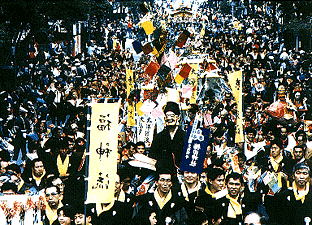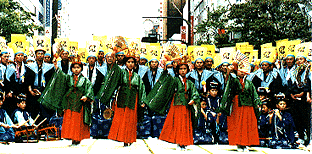ANNUAL CALENDAR May |
|
Hakata Dontaku Festival
|
 THE FACTS
THE FACTSThis colorful festival takes place on May 3 and 4 in the city of Fukuoka in northern Kyushu. The festival evolved from matsubayashi, a folk art widely performed in Kyoto during the Muromachi period (1333-1568). It was performed by farmers and townspeople as a form of New Year's greetings to the local landowner or leader. People dressed up as the three gods of good fortune and paraded to musical accompaniment. The "gods" were followed by young children, who danced to a special chant called iitate. The Hakata Dontaku elevated the traditional matsubayashi into a festive occasion, when people from all walks of life can meet and exchange greetings on an equal footing. |
|
Today, people from all over the country descend on Fukuoka for the festival, which coincides with "Golden Week." It is one of the most popular destinations for vacationers during the holidays in western Japan. In the Edo period (1603-1868), decorative floats and platforms showcasing dolls were added. The name of the festival was adopted around this time: it is believed to be derived from the Dutch word zondag (Sunday), which was taken to mean "holiday".
THE SCENE
Photos: (top)Thousands of people take part in the festival parade; (above) Children perform the traditional matsubayashi. (Fukuoka Chanber of Commerce & Industry) |
Related Links: Dontaku
|
APR | MAY | JUN | JUL | AUG | SEP | OCT | NOV | DEC | JAN | FEB | MAR |
 |
 Each year in early May, a 1.2-kilometer stretch of a major thoroughfare is converted into "Dontaku Square," where a parade is held. Many kids take part in the parade along with adults. Traditional matsubayashi is performed by over 10,000 people belonging to more than 100 groups. Some of these groups use traditional Japanese instruments, while others perform the folk melody with brass instruments.
Each year in early May, a 1.2-kilometer stretch of a major thoroughfare is converted into "Dontaku Square," where a parade is held. Many kids take part in the parade along with adults. Traditional matsubayashi is performed by over 10,000 people belonging to more than 100 groups. Some of these groups use traditional Japanese instruments, while others perform the folk melody with brass instruments.